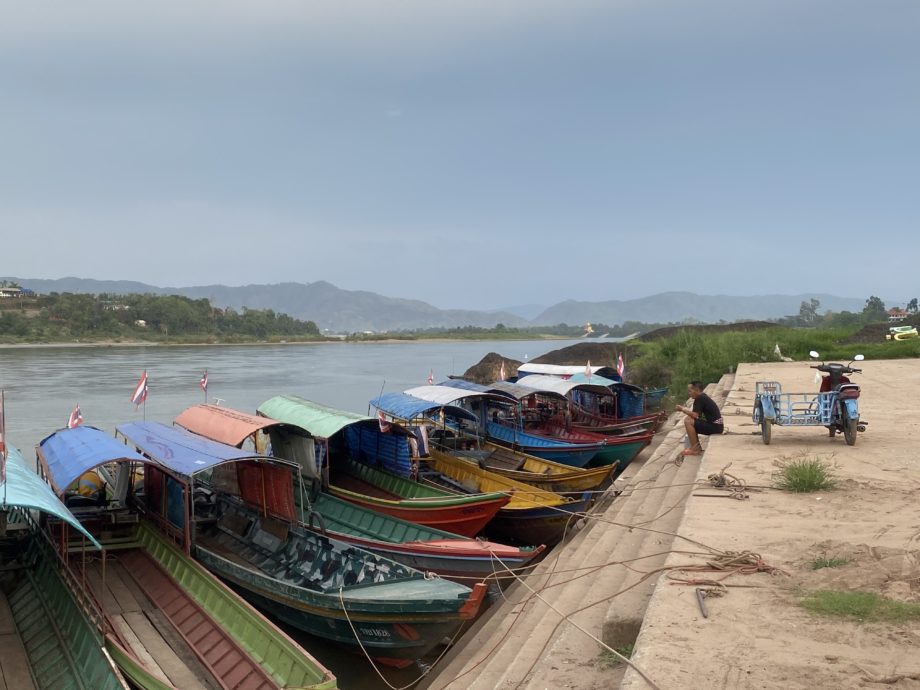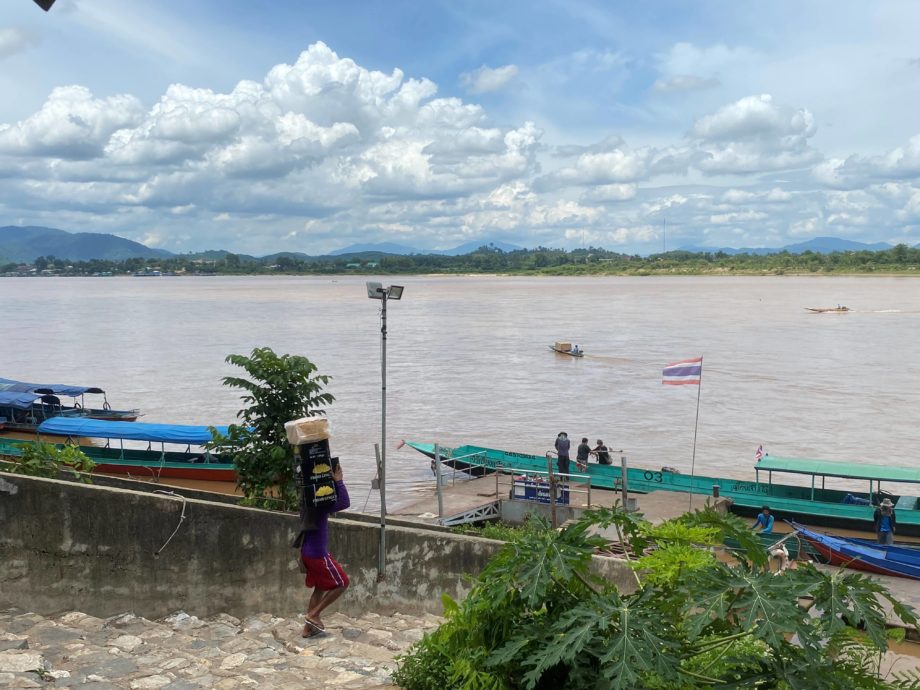Anthropological Research and Responsibility in The Pandemic Moment
Many countries within Southeast Asia, including Thailand and Laos, are currently facing tremendous changes resulted from infrastructure development influenced by the Chinese government. My fieldwork was conducted at the Mekong riverside border towns in Chiang Rai province, northern Thailand. It was the border area of Thailand, Laos, Myanmar, where several Chinese transnational companies have invested. The fieldwork started from October 2019 to August 2020, intending to approach transnational infrastructure projects, i.e., cross-border bridge, highway, and port, with curiosity about their capacity to improve regional economic connectivity and how these infrastructure projects have reconfigured relationship among people along the border. Also, their various responses to the infrastructure projects among different groups of people.
Facing the pandemic crisis, I adjusted my research plan by adding up the research questions on how different groups of people in the border towns dealing with the crisis and how the infrastructure projects have generated impact on them during the coronavirus pandemic? Indeed, the alarming sign of crisis at the border towns began in January 2020; I heard about Chinese tourists who decide to remain in Thai border towns to avoid the epidemic in China. I also met with a Chinese family who traveled across South China’s border through Laos and tried desperately to find long-term accommodation to stay in Thailand. In the first week of March, I left the field for a short trip back to Germany to extend my resident permit. Unexpectedly, after I returned to Thailand, I could not travel back to the field site. Due to the pandemic, my fieldwork schedule was interrupted for almost three months.
Online research versus offline research
In middle March 2020, Thailand began locked down the country, traveling across the province was prohibited. To avoid any further delay in my research plan, I conducted a telephone interview, joined the local resident groups on Facebook, used instant messaging to communicate with people I knew in the town, and followed the town’s Facebook page to keep myself updated to local activities. I also collected Twitter data and followed relevant hashtags on Chinese investment in the dam building along the Mekong River.
In early June, I finally managed to travel back to the towns while the social distancing regulation was still implemented. When I was in the field gain, I began to doubt the information’s validity on those online platforms collected before. I noticed that it was not enough to help me understand the current context of the town. There were only people who could access those online platforms would produce/provide and share information from their own perspective. Staying in the field allows me to immerse myself in the town and learn how different groups of people have various opinions and responses beyond the issues discussed or posted in online sources.
Conducting fieldwork during the crisis was not easy. There were several travel restrictions across borders between Thailand, Laos, Myanmar, and China. The border checkpoints between these countries remain closed since the middle of March. The border towns were changed entirely from the most vibrant trading community to an empty town. Before the pandemic, I traveled freely across Thailand and Laos border. I participated in NGOs’ arranged activities, attended cultural events, interviewed residents and shop owners. I often hanged around in the town center, the port, the cross-border bridge to observe trading activities. During the pandemic period, there was no more so-called normal “everyday life.” Indeed, there was not much happening in the town when there were no Chinese tourists and Laos traders. Many local social and cultural events were also prohibited.

Figure 1: A boat driver sitting on an unusually quiet local pier in Chiang Kong, Thailand. 6 June 2020. Copyright: Panitda Saiyarod.
Bearing witness in the pandemic moment
With the limited time, I made a list of the key persons and conducted structured interviews. The pressure of time made me feel stressed and forced me to make the most out of it. It was challenging because I must consider protecting the people I interacted with, including myself, to be safe from the virus spreading. Despite this, I am aware that fieldwork research is to learn from the everyday sociocultural world; the observation and direct contact with people are the heart of our research. To deepen my understanding of how the community affected by the pandemic, being at the place where it occurred is unavoidable. Fortunately, the pandemic situation in Thailand was better. With their permission, I mostly conducted my interview outdoor, keeping distance, and wearing a mask in the building.
To turn the crisis into opportunity, I took my supervisor’s advice to explore how people react to the crisis? What has been changed during this time? Thus, I started looking for what was not happening? What has been absent? How do people deal with this difficult situation? I found that the crisis exposed how the cross-border bridge has excluded the small traders and local boat drivers out of the cross-border trading chain immediately. Only larger enterprises with broader business connections could legally export commodities through the international bridge toward Laos and China. The Laos boat drivers who smuggled commodities across the river could make a lot of money while Thai boat drivers were suffering from not being allowed to operate service. The issue of “trust and mistrust” trading across the border becomes an important issue that I could explore more in my research.

Figure 2: Myanmar workers loading ginger boxes to awaiting Laos long tail boat at a dock in Chiang Sean, Thailand. 18 July 2020. Copyright: Panitda Saiyarod.
The Future of fieldwork research and anthropologist’s responsibility
This situation led me to seriously consider ethical responsibility as a researcher to avoid causing harm to the communities because circulating among groups of people might worsen the spread of the virus. However, the impact of the pandemic over the past months has obviously shown that only heavily focus on reducing numbers of infections was not enough to lead us out of the crisis inclusively. As an anthropologist, it is also my responsibility to contribute to illustrate these complexities of the pandemic. My fieldwork experience has made me realize the limitation of the visual space. It is clear that there is no tool to entirely substitute for witnessing, participating, experiencing, and feeling. The ability to have a nuanced understanding of context, conflicts, and complexities of relationships comes from my personal experience in the field. The challenging situation leads me to question how we should carry on our fieldwork research toward this uncertain future. In addition, what would be the role of anthropologist and our contribution in the pandemic moment?
Written on 5 October 2020 and revised on 8 October 2020
Panitda Saiyarod is a Ph.D. student in the Department of Social and Cultural Anthropology at Cologne University. The working title of her thesis is “The Clash of Connectedness: Local responses to China’s transnational infrastructure projects in a border town, Thailand”. She has an MSc in Development Anthropology with Merit from Durham University, U.K., and holds a B.A. in Sociology from Fudan University, China. This fieldwork was supported by Lisa Maskell Fellowships, Gerda Henkel Foundation.
Contact: panitda.ps[at]gmail.com

































